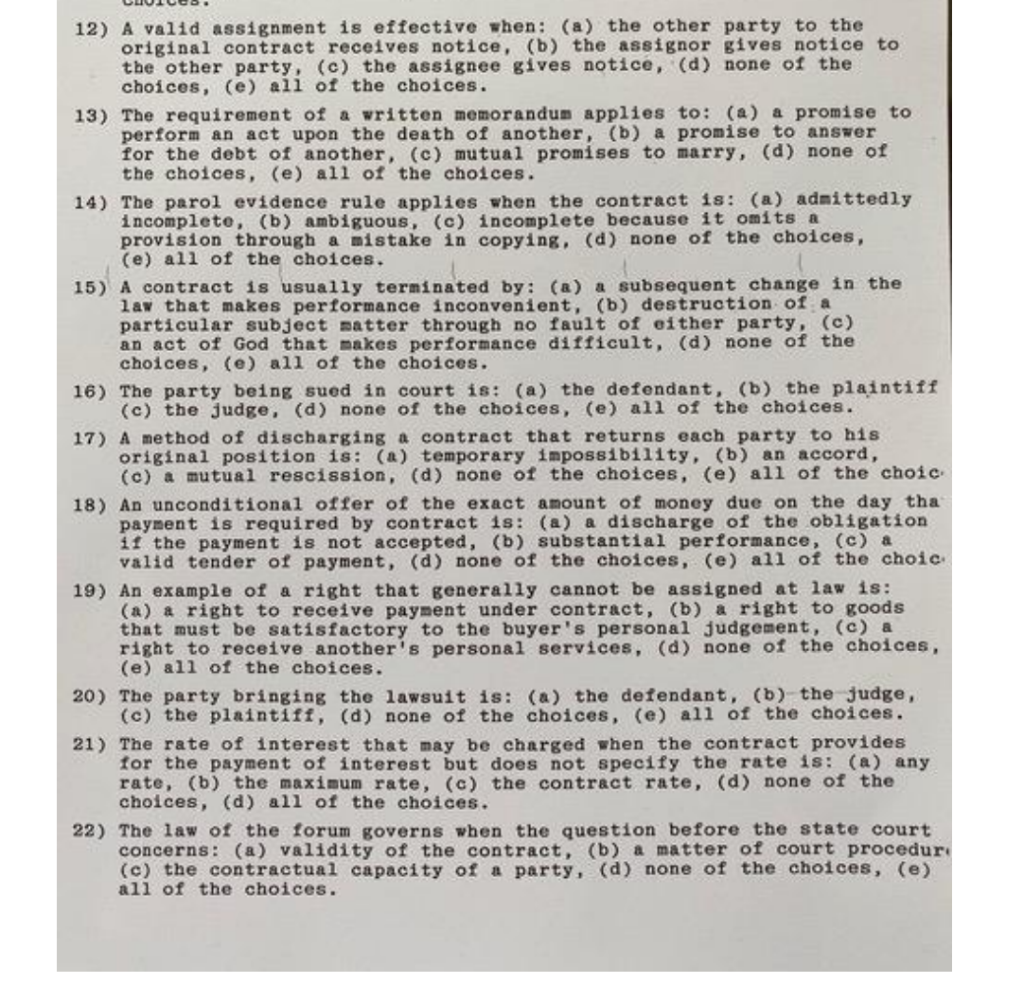Question
12) A valid assignment is effective when: (a) the other party to the original contract receives notice, (b) the assignor gives notice to the other
12) A valid assignment is effective when: (a) the other party to the original contract receives notice, (b) the assignor gives notice to the other party, (c) the assignee gives notice, (d) none of the choices, (e) all of the choices. 13) The requirement of a written memorandum applies to: (a) a promise to perform an act upon the death of another, (b) a promise to answer for the debt of another, (c) mutual promises to marry, (d) none of the choices, (e) all of the choices. 14) The parol evidence rule applies when the contract is: (a) admittedly incomplete, (b) ambiguous, (c) incomplete because it omits a provision through a mistake in copying, (d) none of the choices, (e) all of the choices. 15) A contract is usually terminated by: (a) a subsequent change in the law that makes performance inconvenient, (b) destruction of a particular subject matter through no fault of either party, (c) an act of God that makes performance difficult, (d) none of the choices, (e) all of the choices. 16) The party being sued in court is: (a) the defendant, (b) the plaintiff (c) the judge, (d) none of the choices, (e) all of the choices. 17) A method of discharging a contract that returns each party to his original position is: (a) temporary impossibility, (b) an accord, (c) a mutual rescission, (d) none of the choices, (e) all of the choic 18) An unconditional offer of the exact amount of money due on the day tha payment is required by contract is: (a) a discharge of the obligation if the payment is not accepted, (b) substantial performance, (c) a valid tender of payment, (d) none of the choices, (e) all of the choic 19) An example of a right that generally cannot be assigned at law is: (a) a right to receive payment under contract, (b) a right to goods that must be satisfactory to the buyer's personal judgement, (c) a right to receive another's personal services, (d) none of the choices, (e) all of the choices. 20) The party bringing the lawsuit is: (a) the defendant, (b) the judge, (c) the plaintiff, (d) none of the choices, (e) all of the choices. 21) The rate of interest that may be charged when the contract provides for the payment of interest but does not specify the rate is: (a) any rate, (b) the maximum rate, (c) the contract rate, (d) none of the choices, (d) all of the choices. 22) The law of the forum governs when the question before the state court concerns: (a) validity of the contract, (b) a matter of court procedure (c) the contractual capacity of a party, (d) none of the choices, (e) all of the choices
Step by Step Solution
There are 3 Steps involved in it
Step: 1

Get Instant Access to Expert-Tailored Solutions
See step-by-step solutions with expert insights and AI powered tools for academic success
Step: 2

Step: 3

Ace Your Homework with AI
Get the answers you need in no time with our AI-driven, step-by-step assistance
Get Started


